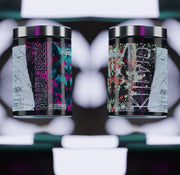Whether you’re a newbie or seasoned veteran in the fitness community, chances are, you’ve heard of creatine. It’s one of the most well-researched supplements on the market, boasting over 500 studies evaluating its effects on muscle growth, metabolism, cognitive function, and other markers of health.
While some people believe creatine carries harmful side effects, these claims have not been supported by any scientific evidence. Rest assured that creatine supplementation is proven to be safe.
Today, we’re going to drop some knowledge bombs and dismantle common myths surrounding creatine. Let’s get nerdy!
What is Creatine?
Creatine is a compound that’s produced in the body from amino acids (building blocks of protein). It’s primarily produced in the liver and slightly less in the pancreas and kidneys.
Creatine is naturally found in the human body, mostly in the skeletal muscles. It stores phosphate groups in the form of phosphocreatine, which is donated to adenosine di-phosphate (ADP), and then converted to adenosine triphosphate (ATP)—the main energy carrier in the body.
ATP is often referred to as the “molecular currency” of the body because it helps store and transport chemical energy within cells. It provides energy to drive many cellular functions, including muscle contraction.

What Are the Benefits of Creatine?
Perhaps the most notable benefit of creatine supplementation is improved strength and power output during resistance exercise. Creatine can rapidly replenish ATP to provide the bursts of energy you need during intense physical activity. This means that the more creatine you have, the more energy your muscle cells can produce during exercise.
In a study published in Medicine and Science in Sports and Exercise, nineteen men were split into two groups. One group received creatine capsules and the other group received a placebo. After 12 weeks, the creatine group showed a 24% increase in a bench press and a 32% increase in a squat, while placebo subjects had a 16% increase in a bench press and a 24% increase in a squat. Researchers also found that “compared with placebo subjects, creatine subjects demonstrated significantly greater increases in Type I (35% vs 11%), IIA (36% vs 15%), and IIAB (35% vs 6%) muscle fiber cross-sectional areas.”
Additionally, creatine supplementation doesn’t seem to improve aerobic exercise performance, but it may increase lean mass when used alongside resistance exercise. In the same study, the creatine group saw an increase in body mass and fat-free mass (lean muscle mass) by 6.3% and 6.3 respectively, which was double the increase that was seen with the placebo group.
While there is much more substantial literature on the physical performance benefits of creatine supplementation than mental performance, it’s still important to note that creatine shows promising cognitive enhancement and neuroprotective properties.
Since our brains require energy (ATP) to properly function, it makes sense that creatine supplementation may help improve neurological diseases and memory.
Creatine supplementation is especially important for vegetarians and vegans who tend to have lower creatine stores from not eating meat. In a 2003 study, vegetarians showed a 50% improvement in working memory performance and a 20% improvement in intelligence test scores after six weeks of creatine supplementation.

Is Creatine Safe?
Perhaps the biggest misconception about creatine is that it’s a steroid that causes kidney damage. While it is a performance-enhancing compound, it does not possess the same mechanisms or structural features of a steroid. Contrary to popular belief, creatine supplementation does not pose any adverse effects on kidney function in healthy individuals.
The mass confusion stems from creatine increasing creatinine levels in the body, which are biomarkers for poor kidney function. However, the increase in creatinine isn’t caused by kidney damage, but rather more creatinine being produced. In simpler terms, creatine does not cause kidney damage, but it can create a false positive due to increased creatinine levels.
Multiple studies—including those published in the International Journal of Sports Medicine, Neurology, and the British Journal of Sports Medicine—show that long-term creatine supplementation is safe in people with healthy kidneys. However, there aren’t any long-term creatine studies examining people with kidney issues, so cautionary use or low-dosing is advised.
Researchers have found that creatine supplementation affects everyone differently. Some people may experience more athletic and health improvements, while others have reported gastrointestinal distress and fluid retention—although these cases are very minor. Overall, creatine is safe to consume if you are healthy and do not have any pre-existing conditions.
What’s the Best Form of Creatine?
There's currently no form of creatine that has been legitimately shown to be more powerful than another, but we gravitate towards creatine monohydrate and hydrochloride for various reasons.
Creatine monohydrate is the most scientifically-supported type of creatine and holds a robust safety record. For this reason, our new non-stimulant pre-workout, FSU, is flawlessly formulated with creatine monohydrate, betaine, pure citrulline, NO3-T® arginine nitrate, and horny goat weed for enhanced muscle pumps and power.
It also packs a powerful punch of tyrosine, NeuroFactor®, and lion’s mane mushroom powder to boost mental focus. On top of that, we've included Pink Himalayan salt and Aquamin™ as exceptional sources of electrolytes and trace minerals.
As for creatine hydrochloride (HCL), it's revered for its exceptional solubility and permeability. In fact, it's 38 times more water-soluble than creatine monohydrate. Since creatine HCL is more bioavailable to your body, this potentially means a reduced dose can be consumed to achieve similar results as creatine monohydrate.
You can find creatine HCL in CR3, which also includes AgmaMax™ agmatine sulfate to assist in nitric oxide production, ActiGin™ to increase VO2 max, and AstraGin™ to improve ingredient absorption.
The Bottom Line
Creatine is undoubtedly one of the best natural supplements for enhancing athletic performance. If you’re looking to increase lean muscle mass, strength, and power, then creatine is for you.
CR3 and FSU are two phenomenal products that offer creatine. Both supplements can be stacked together for insane muscle pumps, increased energy, and maximum power. With the massive data backing up the science behind creatine, you can consume these products with confidence.
-Steffy Kieu, First Lady









58 comments
CeczfHuyIgSE
NBsalRbtCSU
lpQTXCZW
iQpULDbkVHtyMhT
RmvgfMCNV
Leave a comment